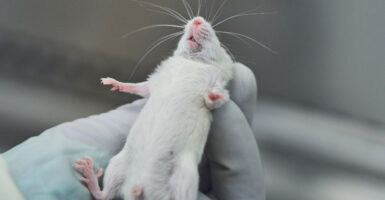One consequence of the recent election is likely to be a surge in efforts to justify research using tissue and organs harvested from the bodies of unborn children killed in elective abortions.
The Trump administration made major progress in ending this unnecessary and unethical research, but the fight is far from over.
A new study in Nature describes how scientists at the University of North Carolina at Chapel Hill have created a “humanized” mouse, called the human “lung-only” mouse.
The article is drawing media attention, ostensibly because the mouse is important for studying the virus that causes COVID-19.
A deep dive reveals that lung tissue from at least 12 aborted babies was used for the study. The babies were likely between 16 and 22 weeks of gestation.
The word “abortion” is never used to describe what happened to those unborn children. Interestingly, though, details of the proper care and housing conditions of the mice used in the experiment were diligently noted.
A study from two years ago involving some of the same authors reveals the truth: Fetal lung tissue was obtained from Advanced Bioscience Resources in Alameda, California—the same tissue-procurement company under congressional investigation for alleged trafficking of aborted baby parts.
Once received, the tissue was dissected, and two pieces implanted onto the backs of mice to create 78 lung-only mice.
Making lung-only mice with fetal tissue is not the same as experiments using fetal cell lines from past abortions. Fetal cell lines can be grown indefinitely and sometimes are used for vaccine production or testing, but even then there are alternatives to fetal cell lines.
Lung-only mice are “one and done” experiments. Once consumed, the body parts are discarded, and new parts from more recent abortions necessarily must be purchased to conduct more experiments.
A recent scientific review tells the horrid tale of fetal tissue research and the tangled web it weaves. Ongoing destruction of human life is required.
And as long as a constant source of funding remains, the supply-and-demand chain is not broken.
Moreover, the lung-only mouse model is flawed and hardly vital for studying COVID-19. Mice inherently cannot be infected with the coronavirus. Aborted baby lung tissue was used so that infection in the mice would occur.
But placing lung tissue on the backs of mice, external to the rest of the body, is neither physiologically nor anatomically appropriate as a clinically relevant model.
Hamsters are one better option, because they can be directly infected with the virus, as are xenografts using lungs from stillborn infants. Other alternatives, such as transgenic mice—which can be produced without fetal tissue—are even available commercially.
It is unconscionable that fetal tissue research continues at all, let alone at taxpayer expense.
An evaluation by the Charlotte Lozier Institute revealed that the National Institutes of Health awarded $109 million in taxpayer funds in extramural grants to 135 researchers at 68 different academic organizations in fiscal year 2019 for experiments using fetal organs—eyes, brains, urinary tract tissue, intestines, hearts, gonads, livers, and thymuses from aborted babies.
The University of North Carolina at Chapel Hill, where those lung-only mice studies were done, was the top awardee, receiving nearly $10 million.
Taxpayer dollars are better spent on scientifically superior, uncontroversial alternatives. Indeed, the previous administration took steps in the right direction.
In 2019, the federal government stopped funding intramural research (research done at government labs) with fetal tissue and made a $20 million down payment to develop modern, ethically derived research alternatives.
Health and Human Services Secretary Alex Azar also put the research community on notice that any further funding of extramural research (such as that done on university campuses) would need to pass an ethics review, activating an Ethics Advisory Board that had never been used, despite existing in federal statute since 1993.
In 2020, that board recommended withholding funds from the majority of research proposals because of rampant ethical missteps and consent issues. More than one-third of the proposals were rejected by unanimous or near-unanimous votes.
With a shift in political winds, fetal tissue research proponents are pushing for fresh attention and dollars. Tragically, under a new administration that claims to “follow the science,” they may get their wish.
President Joe Biden’s nominee to head the Department of Health and Human Services, Xavier Becerra, has vigorously advocated for federally funded fetal tissue research and opposed the Ethics Advisory Board.
If pro-life senators fail to vote against his appointment and Becerra gets the job, the board’s recommendations would be ignored. Current protections also would be overturned to allow for more barbaric experiments using baby body parts.
That puts millions of Americans in an agonizing dilemma. Many are horrified to receive a treatment knowing it relied on the ongoing destruction of innocent life.
Encouragingly, pharmaceutical companies such as Sanofi and even some fetal tissue proponents are actively moving away from using abortion-derived materials—often because the alternatives are more effective anyway.
Researchers have an incredible responsibility. The decisions they make and the tools they choose today will impact the therapies of tomorrow. Rejecting exploitation of aborted children’s bodies is the ethical choice.
The Daily Signal publishes a variety of perspectives. Nothing written here is to be construed as representing the views of The Heritage Foundation.
Have an opinion about this article? To sound off, please email letters@DailySignal.com and we will consider publishing your remarks in our regular “We Hear You” feature.





























